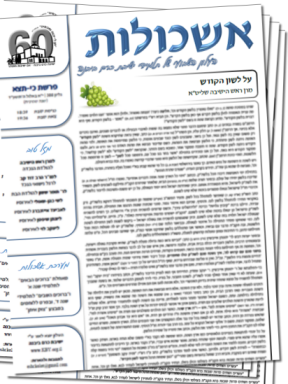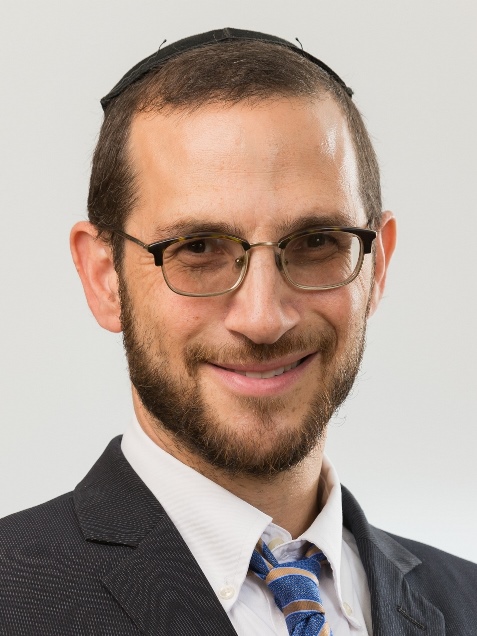תמליכוני עליכם
הרב דני זוקרמן
וכי תבאו מלחמה בארצכם על הצר הצרר אתכם והרעתם בחצצרת ונזכרתם לפני ה' אלקיכם ונושעתם מאיביכם…והיו לכם לזכרון לפני אלקיכם אני ה' אלקיכם (בהעלתך י:ט-י)
In this timely pasuk, the Torah tells us that blowing teruos raises our זכרון in front of Hashem and saves us from our enemies.
The Chumash describes Rosh Hashana as זכרון תרועה (Emor 23:24) and יום תרועה (Pinchas 29:1), from which we understand that, along with blowing the Shofar, we must express the themes of Zichronos and Shofaros.
From the juxtaposition of זכרון and אני ה’ אלקיכם in the pasuk quoted above, Chazal derive that the themes of Zichronos and Shofaros must be complemented by Malchuyos:
אמר רבי יהודה משום רבי עקיבא…[אמרו] לפני בראש השנה מלכיות זכרונות ושופרות; מלכיות כדי שתמליכוני עליכם, זכרונות כדי שיעלה זכרוניכם לפני לטובה, ובמה- בשופר (ר"ה טז.)
Malchuyos is one of the three central themes in Mussaf of Rosh Hashana because Hashem tells us “coronate me over you.”
What does it mean to coronate Hashem over ourselves? This requires specific intent and focus; reciting the ten pesukim of Malchuyos is clearly insufficient. But what is that intent?
The Halacha is that we recite ten pesukim in each section of Mussaf. Three from Chumash, three from Kesuvim, three from Neviim and then one more from Chumash. However, in the Kesuvim section of Malchuyos we find that there are six pesukim, not three.
First we recite the pasuk of …כי לה’ המלוכה, then …ה’ מלך גאות לבש, and then we recite four pesukim in a row:
שאו שערים ראשיכם והנשאו פתחי עולם ויבוא מלך הכבוד:
מי זה מלך הכבוד ה' עזוז וגבור ה' גבור מלחמה:
שאו שערים ראשיכם ושאו פתחי עולם ויבא מלך הכבוד:
מי הוא זה מלך הכבוד ה' צבקות הוא מלך הכבוד סלה:
Each one of these pesukim mentions that Hashem is the king, so one would think that each pasuk could suffice independently. Why do we need the whole set? Indeed, Rabi Yosi (Tosefta Rosh Hashana 2:11) holds that reciting just one of these pesukim suffices. This position seems very reasonable; however, the Halacha follows the position of Rabi Yehuda, who holds that you must recite all four pesukim as a unit. What is the logic of this position?
Obviously, in order to fulfill the mitzva of תמליכוני עליכם, it is not sufficient to merely recite a pasuk- or ten- that mentions the word “מלך.” Each pasuk has an idea that contributes to the theme of Hashem’s kingship and when we recite the pasuk we pronounce and identify with that element of the theme. The opinion of Rabi Yehuda must be that the theme expressed in these four pesukim is not captured by any one of them individually; only the complete set of four pesukim properly captures the idea.
What is the idea expressed in these four pesukim?
Rav Soloveichik explains (Noraos HaRav Vol. 1, 15, Machzor Mesores HaRav pp. 81, 537) that the key to this set of four pesukim lies in the transition from “מי זה” to “מי הוא זה.” When man initially confronts the reality that Hashem is the supreme ruler of the world, his reaction is one of insolence- “מי זה”- “who is this king [such that I should submit myself to him]?” To such a man, the response is “ה’ עזוז וגבור, ה’ גבור מלחמה”- Hashem is powerful and there is no choice but to comply with his demands.
At this stage, Hashem’s kingship is expressed as a matter of authority, but it lacks voluntary human acknowledgement.
“מי הוא זה מלך הכבוד” is a completely different question. Here, man replaces his obstinance with genuine interest. “Who, then, is the king of glory?” At this further developed stage, man not only complies with Hashem’s will as a matter of duty, but voluntarily accepts Hashem’s will as the unbending moral code of the universe.
This transition from forced compliance to voluntary acceptance requires that we recite all four pesukim. Each of us to some degree is resistant to Hashem’s authority; even if we begrudgingly comply with it, we stubbornly cling to our personal autonomy. We must recite all four pesukim to express that total מלכות demands that we transition from pasuk one to pasuk four.
This crucial transition captures the essence of Malchuyos. “תמליכוני עליכם” doesn't only mean that we verbally declare that Hashem is the supreme authority, but that we personally accept his authority. That we identify with his will and dedicate our lives and our selves to fulfilling that will.
This is the תמליכוני עליכם that must complement זכרונות and שופרות in order that שיעלה זכרוניכם לפני לטובה- that Hakadosh Baruch Hu should view us positively this coming Rosh Hashana.
Yehi Ratzon that we should properly perform the mitzva of תמליכוני עליכם this coming Rosh Hashana, and may that, together with זכרונות and שופרות, bring about Hakadosh Baruch Hu’s promise that he will remember us and save us from our enemies.
השיעור ניתן בכ"ג אלול תשפ"ד
קוד השיעור: 9451
לשליחת שאלה או הארה בנוגע לשיעור:

.jpg)

.jpg)
